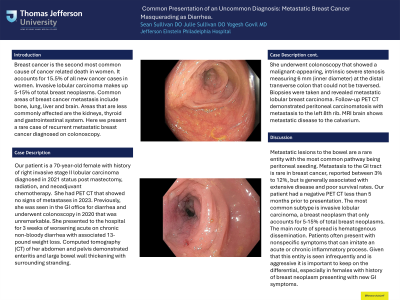Tuesday Poster Session
Category: Colon
P3777 - A Common Presentation of an Uncommon Diagnosis: Metastatic Breast Cancer Masquerading as Diarrhea
Tuesday, October 29, 2024
10:30 AM - 4:00 PM ET
Location: Exhibit Hall E

Has Audio
- SS
Sean Sullivan, DO
Bryn Mawr
Norristown, PA
Presenting Author(s)
Sean Sullivan, DO1, Julie Sullivan, DO2, Yogesh Govil, MD3
1Bryn Mawr, Norristown, PA; 2Einstein Medical Center, Norristown, PA; 3Einstein Medical Center, Philadelphia, PA
Introduction: Breast cancer is the second most common cause of cancer related death in women. It accounts for 15.5% of all new cancer cases in women. Invasive lobular carcinoma makes up 5-15% of total breast neoplasms. Common areas of breast cancer metastasis include bone, lung, liver and brain. Areas that are less commonly affected are the kidneys, thyroid and gastrointestinal system. Here we present a rare case of recurrent metastatic breast cancer diagnosed on colonoscopy.
Case Description/Methods: Our patient is a 70-year-old female with history of right invasive stage II lobular carcinoma diagnosed in 2021 status post mastectomy, radiation, and neoadjuvant chemotherapy. She had PET CT that showed no signs of metastases in 2023. Previously, she was seen in the GI office for diarrhea and underwent colonoscopy in 2020 that was unremarkable. She presented to the hospital for 3 weeks of worsening acute on chronic non-bloody diarrhea with associated 13-pound weight loss. Computed tomography (CT) of her abdomen and pelvis demonstrated enteritis and large bowel wall thickening with surrounding stranding. She underwent colonoscopy that showed a malignant-appearing, intrinsic severe stenosis measuring 6 mm (inner diameter) at the distal transverse colon that could not be traversed. Biopsies were taken and revealed metastatic lobular breast carcinoma. Follow-up PET CT demonstrated peritoneal carcinomatosis with metastasis to the left 8th rib. MRI brain shows metastatic disease to the calvarium.
Discussion: Metastatic lesions to the bowel are a rare entity with the most common pathway being peritoneal seeding. Metastasis to the GI tract is rare in breast cancer, reported between 3% to 12%, but is generally associated with extensive disease and poor survival rates. Our patient had a negative PET CT less than 5 months prior to presentation. The most common subtype is invasive lobular carcinoma, a breast neoplasm that only accounts for 5-15% of total breast neoplasms. The main route of spread is hematogenous dissemination. Patients often present with nonspecific symptoms that can imitate an acute or chronic inflammatory process. Given that this entity is seen infrequently and is aggressive it is important to keep on the differential, especially in females with history of breast neoplasm presenting with new GI symptoms.
Disclosures:
Sean Sullivan, DO1, Julie Sullivan, DO2, Yogesh Govil, MD3. P3777 - A Common Presentation of an Uncommon Diagnosis: Metastatic Breast Cancer Masquerading as Diarrhea, ACG 2024 Annual Scientific Meeting Abstracts. Philadelphia, PA: American College of Gastroenterology.
1Bryn Mawr, Norristown, PA; 2Einstein Medical Center, Norristown, PA; 3Einstein Medical Center, Philadelphia, PA
Introduction: Breast cancer is the second most common cause of cancer related death in women. It accounts for 15.5% of all new cancer cases in women. Invasive lobular carcinoma makes up 5-15% of total breast neoplasms. Common areas of breast cancer metastasis include bone, lung, liver and brain. Areas that are less commonly affected are the kidneys, thyroid and gastrointestinal system. Here we present a rare case of recurrent metastatic breast cancer diagnosed on colonoscopy.
Case Description/Methods: Our patient is a 70-year-old female with history of right invasive stage II lobular carcinoma diagnosed in 2021 status post mastectomy, radiation, and neoadjuvant chemotherapy. She had PET CT that showed no signs of metastases in 2023. Previously, she was seen in the GI office for diarrhea and underwent colonoscopy in 2020 that was unremarkable. She presented to the hospital for 3 weeks of worsening acute on chronic non-bloody diarrhea with associated 13-pound weight loss. Computed tomography (CT) of her abdomen and pelvis demonstrated enteritis and large bowel wall thickening with surrounding stranding. She underwent colonoscopy that showed a malignant-appearing, intrinsic severe stenosis measuring 6 mm (inner diameter) at the distal transverse colon that could not be traversed. Biopsies were taken and revealed metastatic lobular breast carcinoma. Follow-up PET CT demonstrated peritoneal carcinomatosis with metastasis to the left 8th rib. MRI brain shows metastatic disease to the calvarium.
Discussion: Metastatic lesions to the bowel are a rare entity with the most common pathway being peritoneal seeding. Metastasis to the GI tract is rare in breast cancer, reported between 3% to 12%, but is generally associated with extensive disease and poor survival rates. Our patient had a negative PET CT less than 5 months prior to presentation. The most common subtype is invasive lobular carcinoma, a breast neoplasm that only accounts for 5-15% of total breast neoplasms. The main route of spread is hematogenous dissemination. Patients often present with nonspecific symptoms that can imitate an acute or chronic inflammatory process. Given that this entity is seen infrequently and is aggressive it is important to keep on the differential, especially in females with history of breast neoplasm presenting with new GI symptoms.
Disclosures:
Sean Sullivan indicated no relevant financial relationships.
Julie Sullivan indicated no relevant financial relationships.
Yogesh Govil indicated no relevant financial relationships.
Sean Sullivan, DO1, Julie Sullivan, DO2, Yogesh Govil, MD3. P3777 - A Common Presentation of an Uncommon Diagnosis: Metastatic Breast Cancer Masquerading as Diarrhea, ACG 2024 Annual Scientific Meeting Abstracts. Philadelphia, PA: American College of Gastroenterology.
